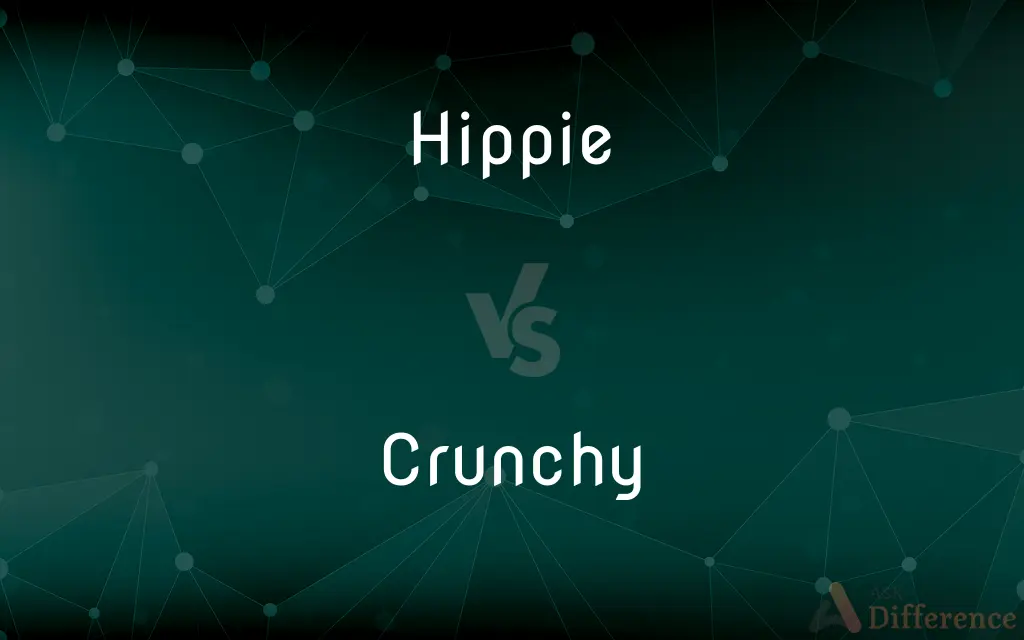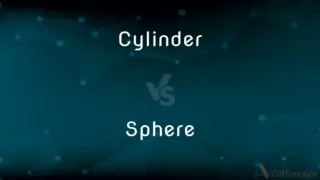Hippie vs. Crunchy — What's the Difference?
By Fiza Rafique & Maham Liaqat — Updated on March 26, 2024
Hippie emphasizes a 1960s counterculture lifestyle focused on peace, love, and communal living, whereas crunchy refers to a modern preference for natural, eco-friendly living.

Difference Between Hippie and Crunchy
Table of Contents
ADVERTISEMENT
Key Differences
Hippies were part of a youth movement in the 1960s that rejected mainstream American life, seeking alternative lifestyles and peace. They were known for their anti-war protests, psychedelic art, and communal living. Whereas crunchy individuals, often called "crunchy moms" or "crunchy people," prioritize natural living, opting for organic foods, cloth diapers, and eco-conscious choices to reduce their environmental impact.
The hippie movement strongly influenced music, fashion, and social norms, advocating for peace, love, and freedom. Music festivals like Woodstock became iconic. On the other hand, crunchy lifestyles have influenced modern consumer choices, leading to the popularity of farmers' markets, sustainable products, and holistic health practices.
Hippies often expressed their views through protests, sit-ins, and expressive fashion, like bell-bottoms and tie-dye. In contrast, crunchy individuals might advocate for their beliefs by supporting local agriculture, choosing natural remedies, and practicing minimal waste lifestyles.
While hippies sought to break away from societal norms through radical political and cultural expressions, crunchy people aim to integrate sustainable and healthy practices within existing social structures, emphasizing personal and environmental health over political activism.
Both movements, though different in their approaches and time periods, share a common thread in challenging the status quo and advocating for a return to more natural, less industrialized ways of living. However, hippies were more aligned with a broader cultural revolution, while crunchies focus on personal and family health and sustainability.
ADVERTISEMENT
Comparison Chart
Era
1960s
Modern
Focus
Peace, love, communal living
Natural, eco-friendly living
Expression
Protests, psychedelic art
Organic products, sustainability
Fashion
Bell-bottoms, tie-dye
Eco-conscious, organic materials
Lifestyle
Communal, anti-establishment
Health-oriented, environmentally conscious
Compare with Definitions
Hippie
A person associated with a subculture from the 1960s known for rejecting conventional society to advocate peace, love, and community.
The hippie wore flowers in her hair as a symbol of peace.
Crunchy
Describes a person who prefers natural living, often focusing on organic food, eco-friendliness, and alternative medicine.
She considered herself crunchy and made her own organic baby food.
Hippie
Advocates for psychedelic experiences and spiritual exploration.
Hippies often gathered in groups to discuss their experiences with psychedelics.
Crunchy
Prefers natural and organic products for health and environmental reasons.
Choosing bamboo toothbrushes is a crunchy way to reduce plastic use.
Hippie
Valued communal living and shared resources.
Hippies lived together in communes to share responsibilities and resources.
Crunchy
Emphasizes sustainability and reducing environmental impact.
Crunchy individuals often use cloth diapers to minimize waste.
Hippie
Known for their distinctive, colorful fashion and lifestyle.
Hippies popularized tie-dye shirts as a form of self-expression.
Crunchy
Supports local and sustainable farming practices.
Buying from the local farmers market is a staple activity for crunchy families.
Hippie
Part of a broader counterculture movement challenging societal norms.
The hippie movement was instrumental in organizing peace marches.
Crunchy
Often involves practices like breastfeeding, cloth diapering, and homeschooling.
Crunchy parents might opt for homeschooling to provide a more tailored education.
Hippie
A hippie, also spelled as hippy, is a member of the counterculture of the 1960s, originally a youth movement that began in the United States during the mid-1960s and spread to other countries around the world. The word hippie came from hipster and was used to describe beatniks who moved into New York City's Greenwich Village, San Francisco's Haight-Ashbury district, and Chicago's Old Town community.
Crunchy
Making a crunching or cracking sound, as when chewed; crisp
Crunchy fresh vegetables.
Hippie
(1950s slang) A teenager who imitated the beatniks.
Crunchy
(Slang) Crunchy-granola
"If they're crunchy types, consider camping out along the way instead of staying at motels" (Jennifer Hanson).
Hippie
(modern slang) A person who keeps an unkempt or sloppy appearance and has unusually long hair (for males), and is thus often stereotyped as a deadbeat.
Crunchy
Likely to crunch, especially with reference to food when it is eaten.
I put some lettuce in the burger to make it more crunchy.
Hippie
Someone who dresses in a hippie style.
Crunchy
(slang) Having sensibilities of a counter-culture nature lover or hippie; derived from the concept of crunchy granola.
San Francisco is a very crunchy town.
Hippie
One who is hip.
Crunchy
A pellet of dry cat food.
Hippie
Of or pertaining to hippies.
That dress looks very hippie.
Crunchy
Pleasingly firm and fresh and making a crunching noise when chewed;
Crisp carrot and celery sticks
A firm apple
Crunchy lettuce
Hippie
Not conforming to generally accepted standards.
They used a bunch of hippie compression formats instead of the usual RAR and ZIP.
Hippie
Someone who rejects the established culture, dresses casually, and advocates extreme liberalism in politics and lifestyle. Used especially of those in the late 1960's, mostly in their late teens and early twenties, who conspicuously rejected traditional culture by dressing casually, if male wore their hair long, and wore folksy or used clothing adorned with beads, headbands, and often flowers; they emphasized the importance of love and direct personal relations rather than success-oriented businesslike behavior, strove for spontaneity, sometimes lived communally, and in some cases tried to expand their consciousness by various psychological techniques such as meditation, or through the use of consciousness-altering drugs such as marijuana or LSD. By the end of the Vietnam war in the 1970's, the numbers of people living a visibly hippie lifestyle had dramatically decreased, though some people continue to develop similar views and live with the same outlook.
Hippie
Someone who rejects the established culture; advocates extreme liberalism in politics and lifestyle
Common Curiosities
What does crunchy mean?
Crunchy refers to a lifestyle choice that emphasizes natural living, organic food, and eco-friendliness.
How did hippies express their beliefs?
Hippies expressed their beliefs through music, protests, psychedelic art, and distinctive fashion like tie-dye and bell-bottoms.
What are typical crunchy practices?
Typical crunchy practices include using organic products, cloth diapering, and supporting sustainable agriculture.
What is a common misconception about hippies?
A common misconception is that all hippies were involved in drug use or lacked work ethic, overlooking their contributions to culture and social change.
Can someone be both hippie and crunchy?
Yes, someone can embody both hippie and crunchy values, focusing on peace and eco-friendly living.
What defines a hippie?
A hippie is defined by their part in a 1960s movement that rejected conventional values for peace, love, and community.
Did hippies influence modern culture?
Yes, hippies influenced modern culture in music, fashion, and social attitudes towards peace and communal living.
Are crunchy practices expensive?
Some crunchy practices can be more expensive, like buying organic food, but others, like minimalism and DIY, can save money.
Why were hippies significant in the 1960s?
Hippies were significant for challenging societal norms and advocating for peace, love, and alternative lifestyles during a time of political and social unrest.
How does being crunchy impact consumer choices?
Being crunchy impacts consumer choices by prioritizing products that are organic, sustainable, and environmentally friendly.
How do crunchy people view healthcare?
Crunchy people often prefer natural remedies and holistic healthcare practices over conventional medicine.
How do crunchy lifestyles benefit the environment?
Crunchy lifestyles benefit the environment by reducing waste, promoting sustainable practices, and encouraging eco-conscious consumer choices.
Was the hippie movement only in America?
While it started in America, the hippie movement influenced and was influenced by global cultures, spreading its ideals worldwide.
What role did music play in the hippie movement?
Music was central to the hippie movement, serving as a form of protest, expression, and community building.
How do hippies and crunchy people view technology?
Hippies often rejected technology as part of mainstream culture, whereas crunchy people may embrace technology if it aligns with sustainable living.
Share Your Discovery

Previous Comparison
Cylinder vs. Sphere
Next Comparison
Pet vs. SlaveAuthor Spotlight
Written by
Fiza RafiqueFiza Rafique is a skilled content writer at AskDifference.com, where she meticulously refines and enhances written pieces. Drawing from her vast editorial expertise, Fiza ensures clarity, accuracy, and precision in every article. Passionate about language, she continually seeks to elevate the quality of content for readers worldwide.
Co-written by
Maham Liaqat















































